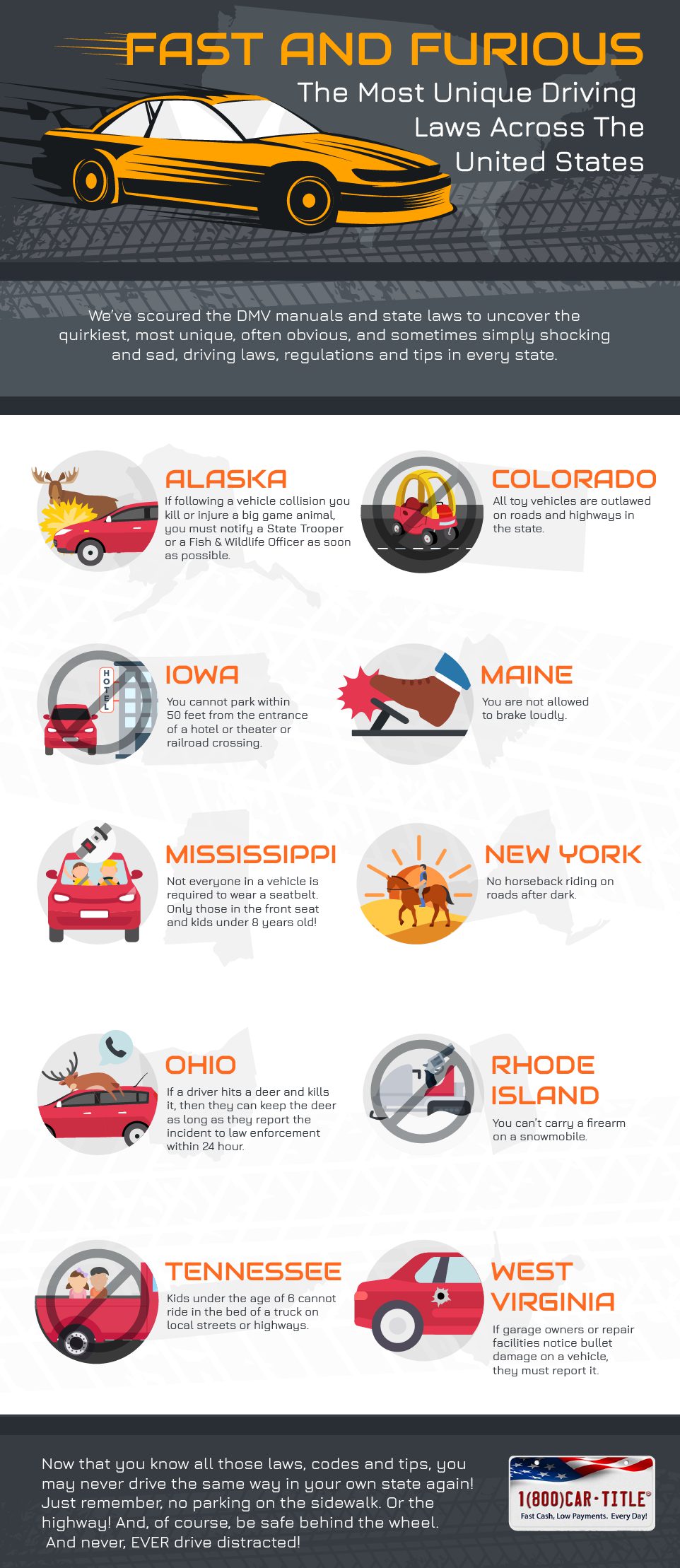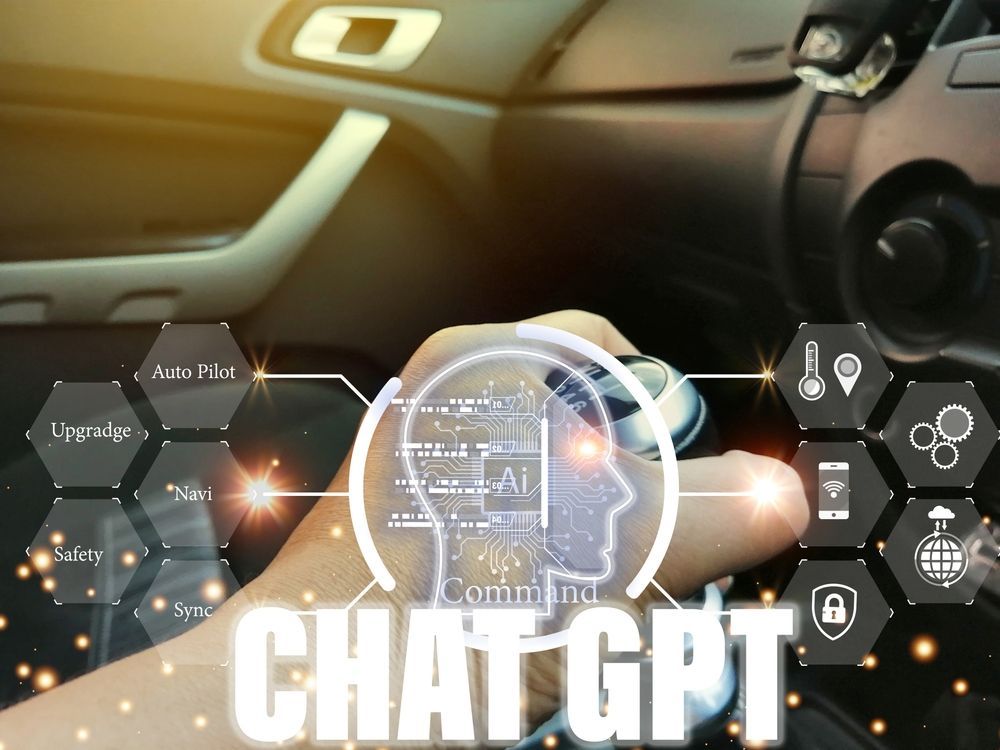Fast and Furious – The Most Unique Driving Laws across the United States
By carloansadmin • October 25, 2018
Thinking about heading out for a cross country road trip? You better make sure you know the rules of the road in every state! While, yes, most driving rules are standard across the U.S., each state has its own set of road regulations. And some state laws might surprise you! We’ve scoured the DMV manuals and state laws to uncover the quirkiest, most unique, often obvious, and sometimes simply shocking and sad, driving laws, regulations and tips in every state. Here are some of the most unique driving laws across the United States!

Alabama: Don’t Steal Gas!
The Alabama Driver Manual 2016 Edition makes it clear that stealing gas is frowned upon, noting that “Senate Bill 459 prohibits a person from driving his or her vehicle off the premises of a gasoline establishment without payment. A person who does so shall be guilty of a Class A misdemeanor. On a second conviction the driver license of the person shall be suspended for a period of six months. On a third conviction the driver license of the person shall be suspended for a period of one year.”
Alaska: What to Do if You Hit a Moose
According to the State of Alaska Driver Manual, there is a procedure you must follow if you hit a ‘big game animal’ like a caribou or a moose. The manual states: “Big game animals killed or injured in a vehicular collision are the property of the state. If, following a vehicle collision, you kill or injure a big game animal, you must notify a State Trooper or a Fish & Wildlife Officer as soon as possible.” You also can contact the local police department, but you need to report the injury or death to authorities.
Arizona: Colorful Curbs
In Arizona, the colors of the curbs hold meaning to drivers. According to The Arizona Driver License Manual and Customer Service Guide , yellow painted curbs mean that you can load or unload your car but need to do it quickly. White curbs are denoted for areas to pick up or drop off passengers. Red curbs denote that you cannot park, stand or stop in those areas (this is a fire zone or other off limit area).
Arkansas: Don’t Be a Litterbug
Thinking about tossing that wrapper out the window? Think again. In Arkansas, the penalty for littering is up to $1,000, plus community service! The Arkansas Driver License Study Guide notes that subsequent violations increase the fine to up to $2,000!
California: Don’t Smoke Marijuana While Driving!
Yes, California has legalized medical marijuana, but there are limitations for when you can use that medicine! As of January 2018, it is against state law “to smoke or ingest marijuana or any marijuana product while driving a motor vehicle upon a highway or while riding as a passenger in a motor vehicle being driven upon a highway.”
Colorado: No ‘Toy Vehicles’ Allowed
Keep those hoverboards away from Colorado roads. All ‘toy vehicles’ are outlawed on roads and highways in the state. According to the Colorado Driver Handbook , these vehicles include “gas-powered or electric-powered mini bikes, pocket bikes, kamikaze boards, go-peds and stand-up scooters that are not designed, approved or intended for use on public roadways or highways.”
Connecticut: Be Mindful of “Vulnerable Users”
Certain individuals on the road are considered “vulnerable users.” This status includes bikers, individuals in a wheelchair, roadside or highway workers and those riding an animal (or “operating” an animal…like carriage drivers). The Driver’s Manual from the State of Connecticut Department of Motor Vehicles notes that these individuals are protected under the state’s Vulnerable User’s Law, which includes heftier penalties for those who commit violations.
Delaware: Don’t Idle
Idling is frowned upon in Delaware. According to state law , “no person may permit the nonessential idling of a locomotive under its control or on its property between 8 p.m. and 7 a.m.” So what defines non-essential idling? Basically, if you aren’t stuck in traffic, heating or thawing your car, under the direction of a police officer or to deal with mechanical or other issues with your car, then you may be in violation.
Florida: No Stickers
Parents know that when kids get stickers, sometimes those little colorful demons end up decorating the car windows. Just say no to those cute stickers in Florida, because they are prohibited! So are signs or posters that are placed in windows or on the windshield.
Georgia: Pick-Up Truck Drivers and Passengers Need a Seatbelt
Georgia passed a law coming down firmly on individuals who drive or ride as a passenger in a pickup truck. The law states that they, too , must wear a seatbelt ! Sound crazy? Apparently, a lot of pickup truck drivers and/or their passengers were not clicking those belts, which made the law a must.
Hawaii: Traffic Islands
In Hawaii, some areas of the roadways have an area called a “traffic island” or “safety islands.” According to the Hawaii Driver’s Manual , “traffic islands are used to direct you into separate traffic lanes, ” and a safety island is an area for pedestrians to safely stand if they have to wait or stand in the road. Don’t cross or drive on these areas!
Idaho: Tips on Driving through the Mountains
Idaho is home to many mountainous areas, and this means taking extra precautions while driving. The Idaho Driver’s Manual advises drivers to take note of any speed signs or warning signs, stay closest to the right edge of the road, shift into lower gears when navigating down steep hills, refrain from coasting (by putting the car in neutral or releasing the clutch), obey all solid yellow lines (no passing!). And, if you can’t see around a curve, honk your horn!
Illinois: Don’t Drive Distracted
The state of Illinois takes distracted driving very seriously. If you’re driving through Illinois, then you need to know that using a cell phone while driving is prohibited! The only exception: hands-free devices (only for ages 19 and up, though). The Illinois Rules of the Road (2016) states that if you are involved in a crash caused by distracted driving, you may face criminal penalties and incarceration.” “ Put the phone down, please!
Indiana: Don’t Drive Crazy on those Rural Roads
Driving through Indiana may take you through lots of back roads but take these areas with caution. According to the Indiana Driver’s Manual , the speed limit for rural divided highways is 60 miles per hour. The speed limits for back roads in rural areas may be much lower, as gravel or dirt roads may make navigation more difficult.
Iowa: No Parking Rules
Iowa has a more expanded ‘no parking’ set of rules in their state. In Iowa, you cannot park within 50 feet from the entrance of a hotel or theater or railroad crossing. You can’t park within 10 feet of a stop sign. Or within 20 feet of a fire station. And don’t even think about parking on the sidewalk!
Kansas: Don’t Text While Driving
Kansas is another state with very clear distracted driving laws. In the Kansas Driving Handbook , there is one bold print line that makes this very clear: “KANSAS HAS PASSED A LAW THAT MAKES IT ILLEGAL TO TEXT MESSAGE WHILE DRIVING.” Bold, all-caps…no question.
Kentucky: Decals and Fuzzy Dice Are a No
In Kentucky, any decals that block your vision are prohibited. This means that placing those cute monograms or family decals might not be such a great idea. Oh, and items hanging from the rearview mirror, are also, per the Kentucky Driver Manual , a big no-no. Just say no to fuzzy dice, dreamcatchers and goofy air fresheners!
Louisiana: Three isn’t a Crowd
The Driver’s Guide provided by the Louisiana Office of Motor Vehicles notes that more than three individuals cannot ride in the front seat! Three is OK, but more becomes the crowd.
Maine: Don’t Brake Too Loudly
Per Maine state law : “Braking or acceleration may not be unnecessarily made to cause a harsh and objectionable noise.”
Maryland: A Yellow “X”
Some states have unique lights or signs. According to the Maryland Driver’s Manual , drivers who see “a flashing yellow x signal or two-way left-turn arrows mean that a driver is permitted to use the lane for a left turn.” However, a red x denotes that you should stay out of the lane!
Massachusetts: Note the Channelizing Islands
According to the Commonwealth of Massachusetts Driver’s Manual, “a channelizing island is a traffic island or pavement marking that guides traffic along certain paths and prevents operation on areas of the roadway.” Don’t cross over these structures!
Michigan: Kelsey’s Law
Kelsey’s Law applies to teens with a Level 1 or Level 2 Graduated Driver’s License. Under Kelsey’s Law , “these teens are prohibited from initiating a call, answering a call, or listening to or engaging in verbal communication through a mobile phone. They could receive up to $295 in fines and costs if they are ticketed.”
Minnesota: Vanessa’s Law
According to the Minnesota Driver’s Manual , Vanessa’s Law restricts the age that a teen can receive a license if they were driving without a license and “had a crash-related moving violation or an alcohol/controlled substance-related violation (a violation of one or more statutes, including DWI, Implied Consent, Open Bottle, or Underage Drinking and Driving/Not a Drop Law) cannot be given a license, instruction permit or provisional license until age 18.”
Mississippi: Seat Belt Laws are Unique
In most states, seat belts are a must. However, the Mississippi Driver’s Manual states that the law only requires front seat passengers to wear a restraint. Kids who are under the age of 8 also must wear a seat belt. The rest, though? That’s the big question. The manual states that “it is recommended that: The driver and all passengers in the vehicle be buckled up…”
Missouri: License to Drive…a Moped!
Don’t think your preteen can cruise on a moped in the streets of Missouri. According to the Missouri Driver Guide , you need a driver’s license to operate a moped on public streets!
Montana: Studded Tire Laws
In the state of Montana, studded tires may only be used from October 1 to May 31. These tires are for snow and other harsh conditions, so summer is the time to change those studs!
Nebraska: Children are not Cargo
Don’t place your kids in the cargo hold of your car, please. The Nebraska Driver’s Manual states that children ages 18 and under are prohibited from riding in cargo areas. After they become adults, though, perhaps those areas are fair game for riding?
Nevada: Your Car Rental Company is NOT Responsible for Your Bad Driving
Don’t think of placing that speeding ticket in the hands of your rental car company, at least not in Nevada. Per state law : “Rental agency not liable for traffic violation by user of rented vehicle.”
New Hampshire: Eco Friendly Vehicles have Benefits
If you’re moving to New Hampshire and own an eco-friendly vehicle—that is one that doesn’t use gas—you should be aware of the different guidelines in the state of New Hampshire. Per the State of New Hampshire Driver’s Manual , “you do not pay a fuel tax at the pumps. Any alternative energy vehicle prepays an annual fee at the time of registration.”
New Jersey: Two People Cannot Ride that Motorized Bike
According to the New Jersey Driver Manual , it is a moving violation if more than one person rides a motorized bicycle. Leave your friend at home!
New Mexico: Booster Seats for Older Kids
Safer New Mexico Now states that state laws require that booster seats are still necessary if an older child (up to age 12) doesn’t fit securely in a regular seat.
New York: No Horseback riding after Dusk
In the state of New York, those who love to go horseback riding must pay close attention to the daylight hours. Per state law : “No person shall ride or lead a horse upon a roadway during the period from one-half hour after sunset to one-half hour before sunrise. The provisions of this section shall not apply to horse-drawn carriages or carts or police officers, peace officers or park rangers mounted on horseback.”
North Carolina: Don’t Park on a Highway
Some driving basics seem obvious, but sometimes the law serves as a reminder. In North Carolina, you cannot park on the highway.
North Dakota: More Parking Advice
The Noncommercial Driver’s License Manual reminds future or current drivers—who might need the extra and obvious instruction—that they should not park in intersections, on sidewalks, or in any area where a “No Parking” sign is posted.
Ohio: When You Hit a Deer
In the Midwest, deer can become a hazard on roadways. Digest of Ohio Motor Vehicle Laws state that if a driver hits a deer and kills it, then they can keep the deer as long as they report the incident to a law enforcement officer (or game protector) within 24 hours of the incident. It is illegal to take a dead deer without reporting the incident.
Oklahoma: Don’t Hang Out in the Left Lane
In Oklahoma, the left lane is for passing. Unlike other states, you can’t cruise in the left hand lane for your entire journey. If you decide to stay left, you may get a ticket. Now move to the right!
Oregon: Milkman Mike Act
The Milkman Mike Act allows for a driver who causes a crash that injures a motorcycle driver or passenger to be charged with vehicular assault.
Pennsylvania: Autocycle Laws
What’s an autocycle? This is a three-wheeled motorcycle that allows the driver to sit—not straddle. The law in Pennsylvania states that those who wish to drive an autocycle only need to have a Class C license. But not everyone can ride in the cycle. The law states that passengers need to be at least 8 years or older.
Rhode Island: Don’t Cross the Highway with a Rec Vehicle
In Rhode Island, state law prohibits teens (16 and younger) from crossing a highway in a snowmobile or other recreational vehicle. You also can’t carry a firearm on a snowmobile…unless it isn’t loaded and in a case.
South Carolina: Driving Those Low-Speed Vehicles
If you have a low-speed vehicle in South Carolina, it can only be operated on roads (or highways) where the speed limit is 35 miles per hour (or slower).
South Dakota: Put the Brakes On, Literally
In South Dakota, the laws spell out the necessity for working brakes on all automobiles. Per state law : “Every motor vehicle, as defined by subdivision § 32-14-1(17) and every trailer, semitrailer, and pole trailer manufactured or sold in this state, and any combination of such vehicles operating upon a highway within this state shall be equipped with brakes in compliance with the requirements of this chapter.”
Tennessee: Don’t Put Kids in the Truck Bed
The state of Tennessee has laws restricting passengers in a truck bed. Specifically, kids under the age of 6 cannot ride in the bed of a truck on local streets or highways if the truck “not exceeding ¾ ton.” On interstate defense highways or state highways, the same terms apply to kids up to age 12.
Texas: When It’s OK to Drive Mobility Devices on the Road
Motorized personal scooters or—as worded by the law—an “electric personal assistive mobility device” can be operated on Texas roads (that have a speed limit of 30 miles per hour or lower): “ (1) while making a direct crossing of a highway in a marked or unmarked crosswalk; (2) where no sidewalk is available; or (3) when so directed by a traffic control device or by a law enforcement officer.”
Utah: No Driving Under age 16
Sorry preteens, no driving in Utah. The law specifically states : “A person under 16 years of age, whether resident or nonresident of this state, may not operate a motor vehicle upon any highway of this state.” There are exceptions, however, as noted in the legal code.
Vermont: The Chain Up Law
If you’re driving a heavy vehicle (more than 26,000 pounds), you are required to use tire chains on Vermont Route 9 during bad weather. This is noted as the “Chain Up Law.”
Virginia: Don’t Keep it Too Cool
In Virginia, your air conditioner could be problematic. The law states: “No motor vehicle operated on any highway shall be equipped with any air conditioning unit unless such device is of a type approved as to safety by the Superintendent.”
Washington: Watch Your Feet, Motorcyclists.
In the state of Washington, foot positioning is pertinent when driving a motorcycle. Straddle the bike, per the law : “No person shall ride a motorcycle in a position where both feet are placed on the same side of the motorcycle.”
West Virginia: Bullet Damage Laws
If garage owners or repair facilities notice bullet damage on a vehicle, they must report it. The law states: “The person in charge of any garage or repair shop to which is brought any motor vehicle which shows evidence of having been struck by any bullet, shall report to the local law-enforcement agency within twenty-four hours after such motor vehicle is received, giving the engine number, registration number, and the name and address of the owner or operator of such vehicle.”
Wisconsin: Don’t Scare the Animals
Frightened animals have made the text of traffic laws in Wisconsin. The law states that “whenever a person riding, driving or leading an animal which is frightened gives a signal of distress to the operator of a motor vehicle by a raising of the hand or otherwise, the operator of the motor vehicle shall promptly stop the vehicle unless a movement forward is necessary to avoid an accident or injury and shall, upon request, stop all motive power until such animal is under control.”
Wyoming: More Animal Safety
In Wyoming, large deer and other game also may be near—or in the middle of—the road. The Wyoming Rules of the Road states that drivers should be aware of signs noting deer crossing. To avoid hitting an animal, slow down, tap the brakes and honk your horn. Report any accident that involves an injured or dead animal.
Now that you know all those laws, codes and tips, you may never drive the same way in your own state again! Just remember, no parking on the sidewalk. Or the highway! And, of course, be safe behind the wheel. And never, EVER drive distracted!
More Resources
- Car title loans online
- Refinance Title Loan
- Get Your Quote Today
- California Car Title Loans
- Georgia Car Title Loans
- How Car Title Loans Work?
- Locations
- Home
- Pink Slip Loans
- Can I Get a Title Loan with an Old Car?
- Sacramento Car Title Loan
- Title Loans ins St Louis
- Fresno Car Title Loans
- Our Community Service
- Arizona Car Title Loans
- Payday Loans vs Title Loans
- Title Loan Options
- How Title Loans Improve your Credit?
- Prestamos Sobre Titulo de Auto
- RV Title Loans
- Salt Lake City Car Title Loans
- Bakersfield Car Title Loans
- Idaho Car Title Loans
- WCC Teams Up with Moneygram
- Our Programs
The post Fast and Furious – The Most Unique Driving Laws across the United States appeared first on (EN) 1(800) Car-Title®.
HOW MUCH IS MY CAR WORTH?


USA Patriot Act Disclosure: Important information about procedures for opening a new account
To help the government fight the funding of terrorism and money laundering activities, Federal law requires all financial institutions to obtain, verify, and record information that identifies each person who opens an account. What this means for you: When you apply for a loan, we will ask for your name, address, date of birth, and other information that will allow us to identify you. We may also ask to see your driver's license or other identifying documents.
Loans may be made by one of several lenders, including: Wilshire Commercial Capital L.L.C. dba 1 (800) Car-Title and Wilshire Consumer Credit, a licensed lender in certain states. Loans not available in all states. In California, loans are made pursuant to a Department of Financial Protection & Innovation (DFPI) Finance Lenders License. See State Disclosures for additional information.
Accessibility Statement. We are committed to ensuring digital accessibility for people with disabilities. We are continually improving the user experience for everyone and applying the relevant accessibility standards in compliance with Web Content Accessibility Guidelines. For feedback on our website accessibility or if you have any problems with the access of our website please call our toll-free number 800-589-0290 or email us at WilshireCustomerCare@WilshireConsumer.com and we will assist you.
Wilshire Commercial Capital, LLC dba 1 (800) Car-Title and Wilshire Consumer Credit is located at 4727 Wilshire Blvd, Suite 100, Los Angeles, CA 90010.
NMLS ID:907578 | Click here for the NMLS Consumer Access Database.
TO REPORT A PROBLEM OR COMPLAINT WITH THIS LENDER, YOU MAY WRITE OR CALL Tracy Bergiman, Director of Compliance, 4751 Wilshire Blvd. Suite 100, Los Angeles, CA 90010, 323-837-5775, tbergiman@westlakefinancial.com.
New Mexico Only: This lender is licensed and regulated by the New Mexico Regulation and Licensing Department, Financial Institutions Division, P.O. Box 25101, 2550 Cerrillos Road, Santa Fe, New Mexico 87504. To report any unresolved problems or complaints, contact the division by telephone at
(505) 476-4885 or visit the website: https://www.rld.nm.gov/financial-institutions/.
Copyright. Wilshire Commercial Capital, LLC. dba 1 (800) Car-Title and Wilshire Consumer Credit. All Rights Reserved.











